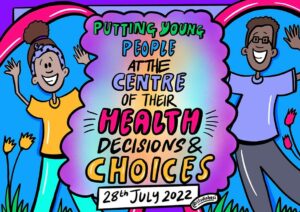Youth-led decision making campaign
Introduction
The 2021 Care Quality Commission National Children and Young Person (CYP) inpatient survey showed that only 47% of CYP surveyed said they’d been involved in decisions about their care. Our objective is to shift this to 95%.
To achieve this, the NHS England London Region Babies, Children and Young People Transformation team partnered with several London youth organisations to co-produce a youth-led event to amplify young people’s voices in their health care.
The event was held in July 2022 at Spotlight Youth Centre with 80 young people and 25 healthcare professionals in attendance.
A poster showcasing the youth-led decision making campaign and next steps was presented at the RCPCH Adolescent Health Conference. Held over 9th and 10th November 2022 in Birmingham.

Methods
1) Co-production
- A group of 15 young people assembled as a steering group to plan, co-design and lead the event.
2) Event activities (all facilitated and led by young people)
- Quiz for Young People to test their knowledge on their rights in Healthcare
- Storytelling – positive and negative experiences in a healthcare setting
- Workshops – discussion between CYP and Healthcare Professionals on:
- Building trust, confidence, and relationships
- Power dynamics and health care
- Accessibility and health care
- Mental Health
- Reverse Panel – Healthcare professionals asked questions to a panel of young experts about their healthcare experiences and how to provide better care.
Results
What young people told us:
- Young people don’t feel listened to or valued by healthcare professionals, which causes mistrust and delays seeking help.
- Being in a traditional health care environment can be stressful for young people. Most prefer to seek care in alternate environments.
- More diversity is needed within the healthcare system and training to provide better care to all ethnicities, gender identities, ages, and cultures.
- Healthcare professionals should take a compassionate and holistic approach to helping young people, valuing the importance of mental health.
- Previous negative experiences with the health care system, and experiences of their peers, influence how CYP feel about health care today.
- Young people are fearful about the future of the NHS.
- Young people find the health care system difficult to access and confusing, especially if you have a disability, learning disability and/or other support need.
- Young people want more choice over their healthcare: where, when, and who they see.
What young people learned:
- Young people have rights in their healthcare
“ I have rights over my care and I am allowed to voice my opinions over my care.”
- The importance of sharing stories with others and speaking up
“[I learned] How much of a change we can make if we work together.”
- A better understanding of the NHS
- Improved relationships with healthcare providers
“Don’t be afraid to trust adults working in the NHS.”
Conclusion
What did we do?
- Empowered CYP through knowledge, skills and advocacy development to better navigate and access health-based resources.
- Raised awareness and improved skills of healthcare professionals to build positive relationships with young people.
Nearly all (98%) of attendees:
- learned something new at the event
- rated the event as good, very good, or excellent.
“[I liked] The fact that it was so youth led… Reverse panel was amazing too.”
View this presentation which captures eight initial themes which emerged from this event. These themes can help services and healthcare professionals to reflect on how they are engaging with young people and what they can do differently.
What’s next?
Healthcare professionals and decisionmakers within the NHS have a responsibility to listen to young people and prioritise their rights in healthcare.
In March 2023, we launched the Our Voice, Our Care campaign to ensure outcomes from this event are embedded into the NHS and young people are put at the centre of their healthcare choices.
